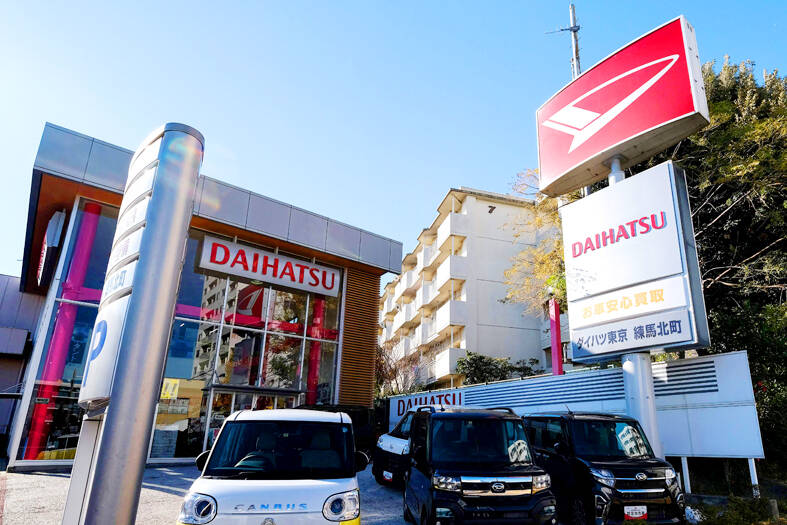Japanese automaker Daihatsu Motor Co has suspended all its domestic production as the Toyota Motor Corp-owned company faces a massive safety testing scandal.
The firm, which has about 9,000 factory workers in Japan, closed the last of its four domestic plants, a Daihatsu spokesman said yesterday.
“Production will be suspended through January. We have not been able to assess as to exactly when our domestic production can resume,” the spokesman said.

Photo: AFP
The move could affect more than 8,000 companies across the nation, market research firm Teikoku Databank Ltd said.
Daihatsu last week said that it had been manipulating safety tests since at least 1989, affecting 64 models, including some sold under the Toyota brand which also are being suspended.
The company in April said that it had been falsifying crash test results for four of its models, involving a total of 88,000 vehicles made in Thailand and Malaysia last year and this year.
Daihatsu in May announced that it was halting production in Japan of two hybrid vehicle models because of similar “irregularities,” including the Toyota Raize sports utility vehicle, manufactured on behalf of its parent company.
So far, there have been no reports of accidents or deaths due to the falsified tests.
Speaking to reporters last week, Daihatsu president Soichiro Okudaira acknowledged the cheating on safety testing and procedures, saying it was tantamount to neglect of safety certificates.
He attributed the problems to pressure on workers to meet ambitious demands for tight development deadlines.

WEAKER ACTIVITY: The sharpest deterioration was seen in the electronics and optical components sector, with the production index falling 13.2 points to 44.5 Taiwan’s manufacturing sector last month contracted for a second consecutive month, with the purchasing managers’ index (PMI) slipping to 48, reflecting ongoing caution over trade uncertainties, the Chung-Hua Institution for Economic Research (CIER, 中華經濟研究院) said yesterday. The decline reflects growing caution among companies amid uncertainty surrounding US tariffs, semiconductor duties and automotive import levies, and it is also likely linked to fading front-loading activity, CIER president Lien Hsien-ming (連賢明) said. “Some clients have started shifting orders to Southeast Asian countries where tariff regimes are already clear,” Lien told a news conference. Firms across the supply chain are also lowering stock levels to mitigate

IN THE AIR: While most companies said they were committed to North American operations, some added that production and costs would depend on the outcome of a US trade probe Leading local contract electronics makers Wistron Corp (緯創), Quanta Computer Inc (廣達), Inventec Corp (英業達) and Compal Electronics Inc (仁寶) are to maintain their North American expansion plans, despite Washington’s 20 percent tariff on Taiwanese goods. Wistron said it has long maintained a presence in the US, while distributing production across Taiwan, North America, Southeast Asia and Europe. The company is in talks with customers to align capacity with their site preferences, a company official told the Taipei Times by telephone on Friday. The company is still in talks with clients over who would bear the tariff costs, with the outcome pending further

Six Taiwanese companies, including contract chipmaker Taiwan Semiconductor Manufacturing Co (TSMC, 台積電), made the 2025 Fortune Global 500 list of the world’s largest firms by revenue. In a report published by New York-based Fortune magazine on Tuesday, Hon Hai Precision Industry Co (鴻海精密), also known as Foxconn Technology Group (富士康科技集團), ranked highest among Taiwanese firms, placing 28th with revenue of US$213.69 billion. Up 60 spots from last year, TSMC rose to No. 126 with US$90.16 billion in revenue, followed by Quanta Computer Inc (廣達) at 348th, Pegatron Corp (和碩) at 461st, CPC Corp, Taiwan (台灣中油) at 494th and Wistron Corp (緯創) at

NEGOTIATIONS: Semiconductors play an outsized role in Taiwan’s industrial and economic development and are a major driver of the Taiwan-US trade imbalance With US President Donald Trump threatening to impose tariffs on semiconductors, Taiwan is expected to face a significant challenge, as information and communications technology (ICT) products account for more than 70 percent of its exports to the US, Chung-Hua Institution for Economic Research (CIER, 中華經濟研究院) president Lien Hsien-ming (連賢明) said on Friday. Compared with other countries, semiconductors play a disproportionately large role in Taiwan’s industrial and economic development, Lien said. As the sixth-largest contributor to the US trade deficit, Taiwan recorded a US$73.9 billion trade surplus with the US last year — up from US$47.8 billion in 2023 — driven by strong